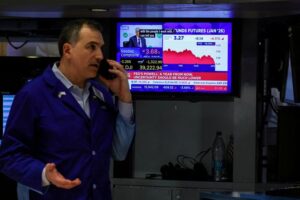Market Anxiety Hits New High Amid Tariff Turmoil
In recent market developments, investor anxiety has surged dramatically, with the Cboe Volatility Index (VIX) hitting an eight-month high. This spike in volatility reflects mounting concerns over potential fallout from U.S. President Donald Trump’s tariff policies, illuminating the fragility of Wall Street and its stakeholders.
On Monday, the VIX, often referred to as Wall Street’s "fear gauge," climbed as much as 14.82 points to reach 60.13—the highest level since August 5. As of the latest reports, the index was trading at 49.83, which marks a striking 4.52-point increase. This unprecedented volatility comes on the heels of a significant selloff across U.S. stocks, raising alarm bells for investors.
The current market dynamics are particularly unsettling, as the S&P 500 inches closer to confirming a bear market, defined by a 20% drop from its recent peak. Yet, amid the turmoil, there was a slight recovery in the benchmark index, which traded up by 0.7% after reports emerged that White House officials were not fully aware of Trump’s potential plans for a 90-day pause on tariffs, excluding China.
Implications of Increasing Volatility
The rise in the VIX has left many analysts pondering the potential for a market recovery. Jim Carroll, a portfolio manager at Ballast Rock Private Wealth, remarked, "The tariff episode has definitely rocketed VIX into panic territory." He emphasized that the lingering question for investors is not just if a recovery will happen, but when and how quickly it will occur.
Historically, the VIX has reflected periods of high market volatility, with its most recent surge reminiscent of the tumultuous climate in August, when fears of a U.S. recession drove traders to hedge against market swings. However, unlike August’s swift retraction in volatility where investors returned to low-risk strategies, experts believe that the resolution of tariff issues will be more drawn out, complicating the landscape significantly.
What’s Next for Investors?
Despite the alarming rise of the VIX, it is essential to keep in mind historical patterns. Adam Turnquist, chief technical strategist at LPL Financial, highlighted that spikes in volatility often coincide with critical points in market sell-offs. "Readings of this magnitude are not only historically rare, but they also often overlap near major capitulation points in market sell-offs," he noted.
Investors at this juncture should consider diversifying their portfolios and possibly engaging in hedging strategies to safeguard against further downturns. While the volatility may indicate fear and uncertainty, it can also present unique investment opportunities for those willing to navigate the risks.
Final Thoughts
As we continue to watch these developments, it’s crucial to stay informed and prepared for whatever the market may bring. The current environment calls for a balanced approach that considers both potential risks and opportunities. Keep an eye on the indicators, as markets can often pivot swiftly based on new information or sentiment changes.
At Extreme Investor Network, we believe that informed investors are empowered investors. By staying ahead of market trends and understanding the underlying factors driving volatility, you position yourself for success in even the most tumultuous times.

